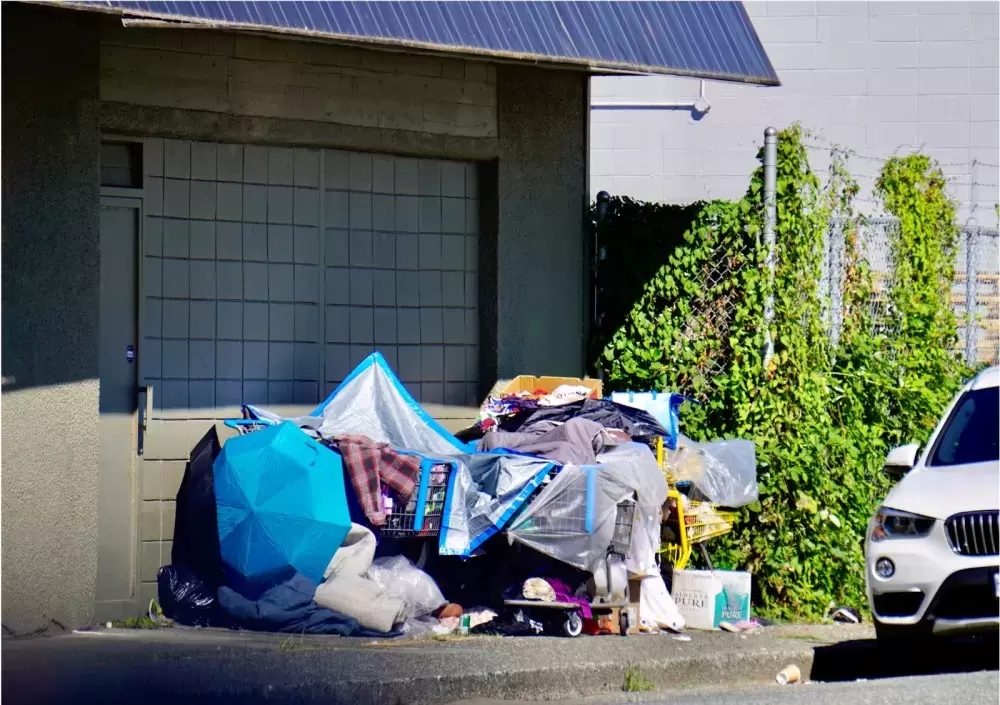The provincial government has awarded Uchucklesaht Tribe $71,000 from its Building Community Bridges project. The grant will assist the treaty nation in its delivery of support and services to its unhoused citizens.
Uchucklesaht Tribe Health and Human Services Manager Evan Jolicoeur is excited about the grant. He said the grant will be used to provide more addictions harm reduction services to Uchucklesaht citizens in need, and also to improve access to in-person support for people at risk in the larger community of Port Alberni. In addition, a portion of the funds will be used towards training service providers about culturally appropriate and respectful service delivery to those that need it. Harm reduction is an approach to working with drug users that focuses on reducing the destructive effects of illicit use, while respecting the human rights of those involved.
The Uchucklesaht Tribe runs its human services programs out of their Nucii building, at 4th Avenue and Redford Street. From there, Uchucklesaht citizens, who are governed by Uchucklesaht tribe under their treaty, may access services related to harm reduction, health, mental health, education, training, child and family wellness, food security, culture as well as social development.
Because Uchucklesaht Tribe is self-governing under treaty, they have had more success in their applications to the provincial and federal governments for grants such as this one, said Jolicoeur.
“Canada and B.C. are treaty partners and B.C. has really stepped up to support our government when it comes to the health and well-being of Uchucklesaht citizens,” said Jolicoeur.
There are 110 Uchucklesaht enrolled citizens on Vancouver Island, most of them in Port Alberni. Of that, 16 citizens are unhoused, according to Jolicoeur.
Uchucklesaht Tribe had a part-time harm reduction worker who worked two days a week. With this funding, they will soon hire a full-time harm reduction worker on a one-year term contract.
“It may be hard because everyone in town is looking to hire harm reduction workers – the need is so great,” said Jolicoeur.
The harm reduction worker will do outreach work, providing support and supplies to those in need. They will also work for the unsheltered and those who are hard to house.
Jolicoeur noted that there are many organizations offering support to those in addictions or who are homeless, but the pandemic has had an effect on some of these services.
“Our citizens may not feel comfortable going to a crowded place for a meal or to access services,” said Jolicoeur. Many feel judged or discriminated against.
The full-time harm reduction worker will provide support to those citizens who have difficulty accessing other services.
Even with all the organizations that offer support services, housing and food in Port Alberni, they just can’t keep up with the demand, according to Jolicoeur. He said there are complex needs beyond the basics of food and housing, like medical needs and mental health issues.
“We are best positioned to help our people when public services are stressed,” he said.
According to MLA Josie Osborne, the provincial investment will allow Uchucklesaht Tribe to provide support services to unhoused people.
“I am so pleased that a local community is receiving this grant to support services that help keep people safe and healthy,” said Osborne, MLA for Mid Island-Pacific Rim.
According to a ministry statement, the grant will be used to support existing programs that respond to the impacts of homelessness.
“This project will improve the capacity for existing support programs, better coordinate the support efforts of multiple agencies and organizations and provide cultural safety, harm reduction and trauma-informed practice training for those working to support unsheltered citizens,” stated the Ministry of Housing.
On that note, Jolicoeur said a portion of the grant will be used to hire a consultant to coordinate services available in Port Alberni. In addition, the consultant will develop a protocol or set of policies for service providers to follow.
“Our people have experienced racism, discrimination and disrespect when accessing services – it is important that service providers know how to treat our people right,” said Jolicoeur.
Another important aspect of coordinating services is to be able to direct people to the best place to access them.
“It’s really hard for people to ask for help because they feel ostracized,” said Jolicoeur.
But coordinating services could ease the pressure.
“Say, for example, a Uchucklesaht citizen goes to Bread of Life in need of food, the people at Bread of Life ask if they’re Uchucklesaht,” he explained. “They can then direct them to Uchucklesaht Tribe for support.”
A final component of the grant is a community-wide training program for harm reduction workers. Jolicoeur believes that by bringing together all of the outreach workers in one place, they can get a baseline of the work that needs to be done. In addition, it will get everyone on the same page of service delivery.
“There will be cultural awareness training so that people know how to work with our citizens in a good way, said Jolicoeur.
This grant is one of 44 distributed by the B.C. NDP government, totaling $15 million invested in projects.
“This funding stream supports local governments and modern treaty nations in building additional capacity to address the needs of unsheltered people in their communities, while also keeping people safe and healthy,” reads the government statement.

